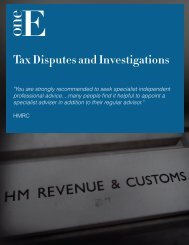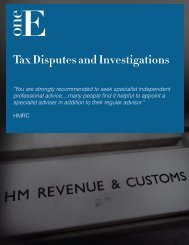Change to taxation of Landlords
Create successful ePaper yourself
Turn your PDF publications into a flip-book with our unique Google optimized e-Paper software.
Considering<br />
Incorporation?<br />
Two important questions must be<br />
considered when discussing the<br />
incorporation <strong>of</strong> a property portfolio:<br />
1. Will incorporation be more efficient<br />
than personal ownership?<br />
2. What costs will be incurred in<br />
incorporation?<br />
Looking at the first question, in<br />
considering whether incorporation is a<br />
better structure than personal ownership<br />
there are a number <strong>of</strong> points that must be<br />
considered:<br />
- Does the client require the income for<br />
subsistence, or would prefer it was<br />
retained / reinvested in the property<br />
business?<br />
- Are they a basic, higher or additional<br />
rate taxpayer?<br />
- How highly leveraged is the portfolio,<br />
and therefore, how affected might your<br />
client’s property portfolio be by these<br />
changes?<br />
- Are they primarily focused on reducing<br />
costs, or are the other advantages <strong>of</strong> a<br />
limited company (such as limitation <strong>of</strong><br />
liability) also considered attractive?<br />
If there’s one thing we’ve learned on<br />
advising landlords over the years, it’s that<br />
there really is no one-size-fits-all<br />
approach <strong>to</strong> advice in this area. Only by<br />
ensuring the landlord discusses their<br />
objectives in detail with an experienced<br />
practitioner is it possible <strong>to</strong> determine the<br />
right investment structure.<br />
Next, when determining the costs on<br />
incorporation, we must first mention that<br />
we can’t go in<strong>to</strong> detail. However, in<br />
general terms, alongside the set up and<br />
compliance costs <strong>of</strong> a company (which<br />
are not <strong>to</strong>o expensive), a transfer <strong>of</strong><br />
property in<strong>to</strong> a limited company would<br />
typically result in capital gains tax and<br />
stamp duty land tax consequences (as if<br />
it were a market value sale <strong>to</strong> a third<br />
party).<br />
This can be costly. However, statu<strong>to</strong>ry<br />
reliefs are available <strong>to</strong> reduce – or even<br />
eliminate – these tax charges where<br />
certain conditions are met and, where<br />
appropriately structured, additional tax<br />
advantages can arise, such as an uplift<br />
in base cost <strong>of</strong> the properties. It’s<br />
important <strong>to</strong> note that this is all about<br />
making use <strong>of</strong> tax reliefs in the way they<br />
are intended in light <strong>of</strong> recent case law<br />
and HMRC practice.












